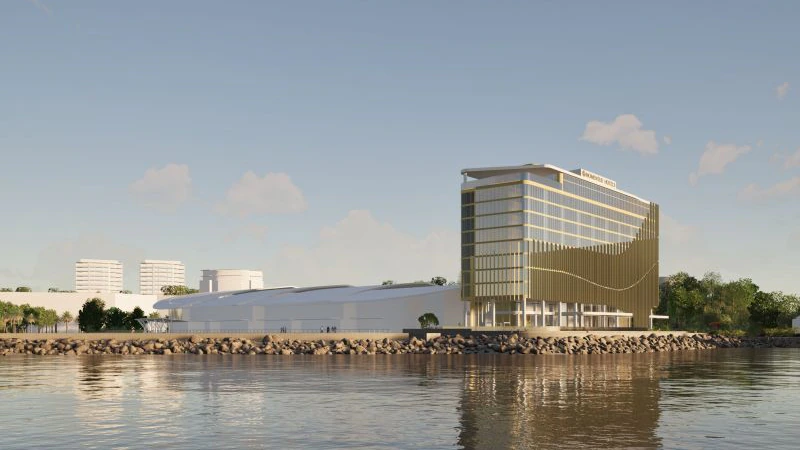By Roxanne Fitzgerald,Sam Parry
Copyright abc

The Northern Territory government and a Singapore-backed developer have overcome a key obstacle to their proposed hotel on the Darwin Waterfront, after the Aboriginal Areas Protection Authority (AAPA) added new names to a decades-old certificate in a move slammed by one critic as “legislative vandalism”.
The development of a high-rise hotel at Stokes Hill on Darwin Harbour was announced in May last year, with the government describing the project as a major boost for Darwin offering jobs, tourism and up-scale accommodation.
But plans stalled after the project faced strong opposition from traditional owners and questions about transparency over the government’s deal with the developer, SH Darwin.
Larrakia elders said the hotel would sit directly opposite a sacred site, and, at a proposed height of 47 metres, would interfere with the Dreamtime story of the site.
In May, the NT government amended the Sacred Sites Act to “streamline” the laws and reduce red tape.
While AAPA board members and traditional owners said the changes to the laws were “rushed” and risked weakening protections for sacred sites, Labor MLA Chansey Paech claimed the bill “exists solely to clear the pathway” for the Waterfront hotel development.
On Thursday, NT sacred sites watchdog AAPA announced SH Darwin and the Darwin Waterfront Corporation had been added to the existing authority certificate, which was issued to the NT government in 2004.
The addition marks one of the first uses of the government’s law changes, which allow extra parties to be added to an existing authority certificate.
AAPA also said the law changes compelled the authority to process such applications without further consultation with traditional owners.
AAPA chair Bobby Nunggumajbarr said the board had “very serious concerns about the use of a 20-year-old certificate” being used to progress the hotel project.
“The old Waterfront certificate does not detail a high-rise hotel next to the convention centre or alongside the registered sacred site. Plans for a tower in that location were not part of the original Larrakia consultation,” he said.
“More recent certificates for development around Stokes Hill, including for the Larrakia Cultural Centre, set strict height limits to protect the sacred site.
“Larrakia custodians have been very clear that the current SH Darwin Hotel design will impact the site.
AAPA board member Rachel Perkins resigned effective immediately over the issue, saying she made the decision “on principle”.
“It was one of the most heartbreaking things to sit with that board, which is comprised of extremely respected Aboriginal men and women … and watch them have to make the decision to sign the transfer. They had no other choice,” she said.
“AAPA is being manipulated, and the existing authority certificate is being manipulated, and it goes against honest principles of doing business. We need to take a stand and point out that it’s wrong.”
AAPA said it would write to federal Indigenous Australians Minister Malarndirri McCarthy and Environment and Water Minister Murray Watt in support of Larrakia custodians’ objections to the hotel development.
In a letter sent in July, obtained by the ABC, Treasurer Bill Yan informed Larrakia stakeholders “of the NT government’s next steps to deliver the hotel” and outlined its intention to use recent changes to the Sacred Sites Act to make that happen.
“In line with the new section 24B of the Sacred Sites Act, the NT government has applied to AAPA to add recorded parties to the NT government’s existing certificate for the Waterfront redevelopment,” he wrote in the letter.
“Importantly and in line with the new provisions, all recorded parties will be required to fully comply with these conditions under the 2004 certificate.”
Former chief executive of the Larrakia Development Corporation, Nigel Browne, slammed the government’s amendments to the Act as a “backdoor way” for the government and Darwin Waterfront Corporation to get what they wanted.
“What this government is signalling now to the rest of the territory is that if your sacred sites or sites of significance are in the way of private dollars, you lose out.”
In a statement, Tourism and Hospitality Minister Marie-Clare Boothby welcomed Thursday’s announcement and said the changes to the Sacred Sites Act were long overdue “to restore certainty for pastoralists and industry, while also strengthening protections for sacred sites”.
She said the change also “reduces unnecessary duplication and guarantees that any conditions protecting sacred sites apply equally to new parties”.



